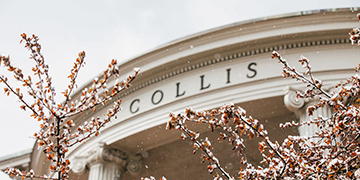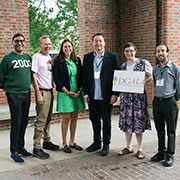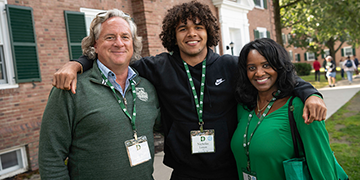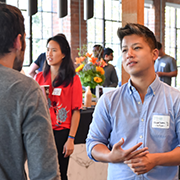From The Jack-O-Lantern to John Oliver
Comedy writer Owen Parsons ’08, an eight-time Emmy winner, talks about the value of working with feedback and the joy of exploring “esoteric, weird, or boring-sounding topics.”
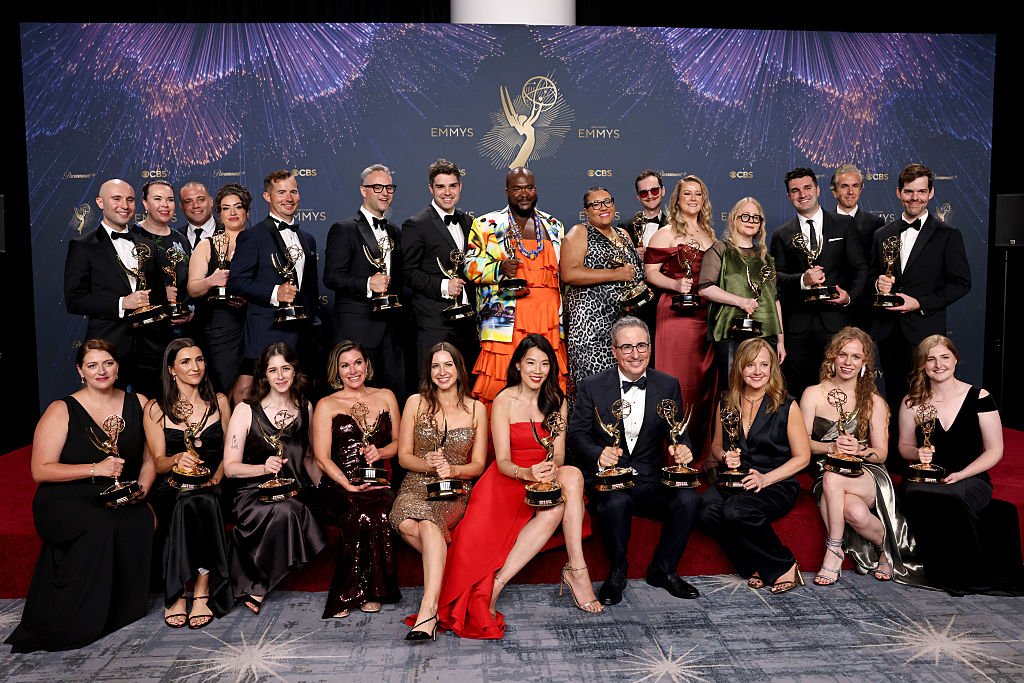
Sep 16, 2025
8 minute read
James Bressor
8 minute read
Owen Parsons ’08 (far right, back row) poses with the cast and crew of Last Week Tonight with John Oliver in the press room during the 77th Primetime Emmy Awards. Photo credit: John Shearer
Early on while growing up in Knoxville, Tennessee, Owen Parsons ’08 discovered the possibilities of comedy. He says he wasn’t the most popular kid, but being funny “was a way to gain friends and smooth out some of the rough edges.” His comedy writing started in high school, and he contributed to The Dartmouth Jack-O-Lantern and participated in the improv group Casual Thursday as an undergraduate. After a stint working for the website CollegeHumor, Parsons broke into late night at The Daily Show with Jon Stewart, where he won an Emmy. He currently writes for Last Week Tonight with John Oliver. Parsons has brought home seven more Emmys in his current gig, receiving his most recent statuette September 14. He and his wife, Paulie Dibner, an executive editor with Hearst Magazines, live in Brooklyn.
Q: Who were some of your early comedy influences?
I gravitated toward big, silly stuff. I read a lot of comics early on—The Far Side, Garfield, and Dilbert. I was very much into The Simpsons, which I started watching well before my parents allowed it, so the show had a forbidden quality to it. I loved Monty Python, and I’d also listen to old Bob Newhart albums. And Weird Al Yankovic is a big common point of humor for the people I’ve worked with.
Q: What led you to Dartmouth?
I knew I wanted to go to school in New England. I wanted the postcard college experience of a close-knit community. Also, I had applied early to Yale and was rejected immediately. There was no wait-listing. They were like, “Absolutely not.”
Q: What stands out the most from your Dartmouth experience?
The friends I made there. I’m still close with a lot of them. I also, as one does, got involved in Greek life. I joined Sigma Nu, which many of my friends had already joined. I enjoyed that sort of community within a community.
Q: At the time, did you have an inkling that a career in comedy was possible?
In high school, some friends and I had basically brute-forced our school newspaper into becoming a comedy magazine by our senior year, and I was making home movies with friends. At Dartmouth, I got involved with The Jack-O-Lantern and Casual Thursday. Comedy was just the thing I was always drawn to. I definitely did not know if I would be able to make a career doing this.
Q: How did your comedy evolve at Dartmouth?
Exposure to an audience is always the way that you get better at doing anything audience-related, whether it was performing shows with Casual Thursday or getting feedback from editors at The Jack-O-Lantern. A lesson I soon learned, which has served me well, is that you get better by working with the feedback rather than being super precious about anything.
Q: Where did you go after graduating?
I moved to New York with friends. We spent that summer scanning entertainment job listings, walking around the city with our résumés, trying to get a foot in the door somewhere, and watching our bank accounts slowly go down. Eventually we had a meeting with Dan Powell, a Dartmouth alum who worked at Comedy Central. He very graciously made time for three 22-year-olds—Alex Rogers, Mike Trapp, and me, all ’08s—so we could ask him about comedy. He didn’t hire us, understandably, although he did kindly let us take home some Chappelle’s Show DVDs. But he did suggest that I get in touch with Sam Reich, who at the time was in charge of video at CollegeHumor. Sam told me they had a paid internship program. That was my foot in the door.
Q: How long did the internship last?
About three months. They liked me enough to ask if I would stay on longer; I asked if they had a job with health insurance. They did, in sales. So, for a few years I was writing PowerPoint decks for the sales department at CollegeHumor. The entire time I was there, however, I was drawing comics or writing articles. Eventually, a job opened up on the creative side, and I moved over.

Q: This was your first paid job as a comedy writer. How was it?
It felt like a continuation of the vibe at The Jack-O-Lantern or at Casual Thursday. I was surrounded by a group of incredibly funny, supportive people who had somehow gotten the backing of a large media corporation to finance silly videos and articles.
Q: How did you make your way to The Daily Show?
CollegeHumor had just moved its HQ to Los Angeles, so I uprooted my entire life and followed the team across the country. Around the same time, I decided to start applying to late-night shows, mostly as a way to practice writing packets, a kind of work sample. I applied for a job at The Daily Show but didn’t expect to get anywhere near this institution I had been watching every night for a decade. I got a first interview, and then a second, and at every point in the process I thought, “Well, this is where I’m going to fall off the list of candidates.” When the producer called to offer me the job, I was so genuinely stunned the only thing I could think to say was, “Thank you, I need a little time to think about it,” and then spent the next hour sitting at my desk in LA thinking, “You idiot, say yes before they change their mind!” I called him back and said, “Yes.” And that’s how I moved back to New York to work on The Daily Show.
Q: Was it intimidating?
I was terrified. For the first year I kept thinking, “This is everything I’ve hoped for, and I’m going to screw up. Jon Stewart’s going to fire me personally.” The Daily Show was a real job with meetings, benchmarks, and deadlines that you had to hit or there’s no television show at the end of the day. Everything moved so fast. On the other hand, I believe the show was in its 15th year when I joined, so the machine ran smoothly.
Q: What was a day like?
We’d meet in the morning to plan out the show in broad strokes, and then writers would go off and take an hour or so to script it out. I had never written with that kind of time crunch before. My job was basically to give them as many good options as possible and not worry about making the jokes perfect—that would happen over the course of the day.
Q: You moved on after about three years. Why?
While I was at The Daily Show, I had worked well with Jordan Klepper. When Comedy Central decided to give him the 11:30 slot for his own show, he invited me to come with him as head writer. This became The Opposition, which was a sort of satirical, Infowars-style, fake newscast. Kind of an evil Daily Show. It got canceled after a year, which was extremely unfortunate. We were still figuring out the show’s voice, and a lot of really talented people poured their heart into it. But it was definitely fun while it lasted.
Q: Then you found your way to HBO.
I regularly watched Last Week Tonight with John Oliver, and I was jealous of the fun work they got to do on HBO without the constraints of cable television. I was lucky that they happened to be hiring at the time.
Q: You joined a show that is an Emmy-winning machine. How would you describe it?
It’s a combination of writing a book report and making the stupidest jokes you can think of in a room full of smart friends. Having the freedom to explore unbelievably esoteric, weird, or boring-sounding topics and make them interesting, funny, or relevant is a blast. My favorite thing about the show is that we can say, “Hey, we’re going to talk to you about UFOs for 30 minutes,” and we have an audience who will be like, “Sure, let’s see what you’ve got.”
Q: Do you have a favorite kind of topic?
I enjoy taking a topic that people think they know about, such as the show we did about recycling, and showing them how weird and deep it really goes. On the flip side, it’s fun to show people a world they never imagined at all. We did a piece on the president of Turkmenistan, who does things like release a video of himself shooting at targets while riding a bike and his generals are applauding him. You don’t know anything about this world, but you should because it’s fascinating.
Q: The New York Times recently described John Oliver’s anger as “moral outrage.” Do you share most of his outrage?
We don’t ever start with the mindset of, “What are we going to be outraged about this week?” We want to make comedy, and part of writing comedy is about identifying elements of life that are true and relatable. And people are living with a lot today where moral outrage is a relatable reaction.
Q: You’ve won seven Emmys at Last Week Tonight. Does each win put more pressure on you and the team?
There’s some pressure because it’s a show that people really like, so we don’t want to let those people down. Also, if a joke bombs, John Oliver locks the writer who wrote it in the Pain Box, where they suffer exquisite tortures for as long as their howls please him. It’s all pretty standard stuff.
Q: Did you ever imagine this level of success?
I did not. I won an Emmy at The Daily Show in 2015, and that felt like the summit. The opportunity to keep going from there is very flattering and humbling.
Q: Thoughts about CBS cancelling The Late Show with Stephen Colbert?
It’s heartbreaking. I know several writers on that show, and they’re all extremely good at what they do. The fact that we’re at a place where, whatever the motivation behind it, CBS can just kill that property is sad. I’m definitely worried about the future of TV in general and about the future of late night specifically.
Q: Would you like to stay with Last Week Tonight for a few more years?
Yes. I love the people here, the work, and the product. There is certainly other stuff I want to do. I’ve written some screenplays and pilots, and there are other things I’d like to try my hand at, but I don’t have any sort of timetable in my mind.
Q: Final thoughts?
More people should watch television and subscribe to YouTube channels. And if anyone reading this is standing next to the big lever that makes late-night TV comedy a massively successful business model again, they should go ahead and flip that—please and thanks!


